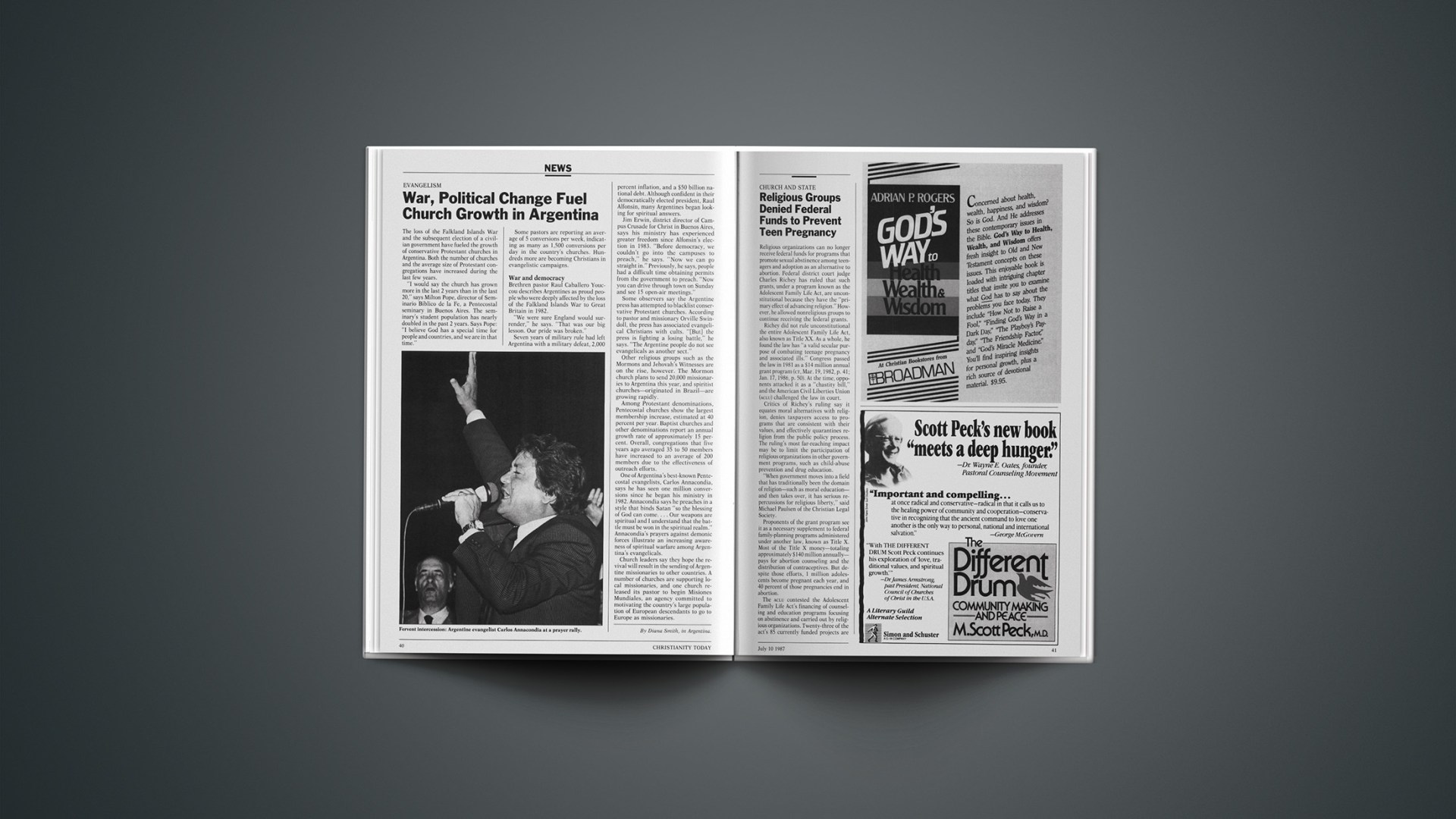The loss of the Falkland Islands War and the subsequent election of a civilian government have fueled the growth of conservative Protestant churches in Argentina. Both the number of churches and the average size of Protestant congregations have increased during the last few years.
“I would say the church has grown more in the last 2 years than in the last 20,” says Milton Pope, director of Seminario Biblico de la Fe, a Pentecostal seminary in Buenos Aires. The seminary’s student population has nearly doubled in the past 2 years. Says Pope: “I believe God has a special time for people and countries, and we are in that time.”
Some pastors are reporting an average of 5 conversions per week, indicating as many as 1,500 conversions per day in the country’s churches. Hundreds more are becoming Christians in evangelistic campaigns.
War And Democracy
Brethren pastor Raul Caballero Youccou describes Argentines as proud people who were deeply affected by the loss of the Falkland Islands War to Great Britain in 1982.
“We were sure England would surrender,” he says. “That was our big lesson. Our pride was broken.”
Seven years of military rule had left Argentina with a military defeat, 2,000 percent inflation, and a $50 billion national debt. Although confident in their democratically elected president, Raul Alfonsin, many Argentines began looking for spiritual answers.
Jim Erwin, district director of Campus Crusade for Christ in Buenos Aires, says his ministry has experienced greater freedom since Alfonsin’s election in 1983. “Before democracy, we couldn’t go into the campuses to preach,” he says. “Now we can go straight in.” Previously, he says, people had a difficult time obtaining permits from the government to preach. “Now you can drive through town on Sunday and see 15 open-air meetings.”
Some observers say the Argentine press has attempted to blacklist conservative Protestant churches. According to pastor and missionary Orville Swindoll, the press has associated evangelical Christians with cults. “[But] the press is fighting a losing battle,” he says. “The Argentine people do not see evangelicals as another sect.”
Other religious groups such as the Mormons and Jehovah’s Witnesses are on the rise, however. The Mormon church plans to send 20,000 missionaries to Argentina this year, and spiritist churches—originated in Brazil—are growing rapidly.
Among Protestant denominations, Pentecostal churches show the largest membership increase, estimated at 40 percent per year. Baptist churches and other denominations report an annual growth rate of approximately 15 percent. Overall, congregations that five years ago averaged 35 to 50 members have increased to an average of 200 members due to the effectiveness of outreach efforts.
One of Argentina’s best-known Pentecostal evangelists, Carlos Annacondia, says he has seen one million conversions since he began his ministry in 1982. Annacondia says he preaches in a style that binds Satan “so the blessing of God can come.… Our weapons are spiritual and I understand that the battle must be won in the spiritual realm.” Annacondia’s prayers against demonic forces illustrate an increasing awareness of spiritual warfare among Argentina’s evangelicals.
Church leaders say they hope the revival will result in the sending of Argentine missionaries to other countries. A number of churches are supporting local missionaries, and one church released its pastor to begin Misiones Mundiales, an agency committed to motivating the country’s large population of European descendants to go to Europe as missionaries.
By Diana Smith, in Argentina.










